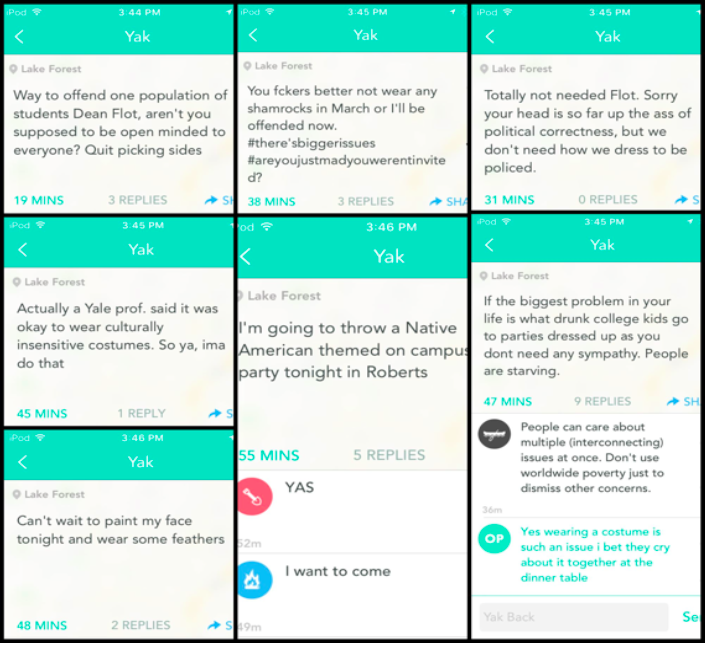Revisiting the Party Almost One Year Later

Last fall, while checking Facebook one night, I found a number of questionable photos of Lake Forest students dressed in mock Native American outfits for a party. On November 21, 2015, Dean of Students Robert Flot sent an email to the student body with expressed concern for the “racially insensitive and tasteless” costumes worn.
Shown in a few of the Yik Yak responses, the email was not universally agreed upon. I wondered why that was the case. If groups of people were marginalized for public display in costumes that misrepresented their culture and undermine their accomplishments, why would it be deemed offensive?
Professor of Sociology and Anthropology David Boden said cultural appropriating “becomes problematic when done unquestionably. When it becomes a style and removed from culture, the meaning of the representation is lost. Historical accuracy is not offensive, but re-symbolizing is.”
Furthermore, Professor of Sociology and Anthropology Christopher Todd Beer said, “For most of American history, it has been deemed okay. Now it’s deemed not okay. These types of things were permitted because they were used to degrade other groups as caricatures. These were tools of white power because degrading another group to make them appear as savages and buffoons makes it seem okay to prevent them from having full citizenship.”
The professors described the offense caused by cultural appropriation, but I wondered why some of the students react defensively. “Culture says it is ok,” Boden said. “People can be shocked because they believe they are not doing more than what they see in general culture. People respond defensively because if we keep acting this way, it will be okay. To force change means that people will fight back.”
Beer explained the significance of such responses. “People’s initial response to an aggressive attack of people objectifying a group will be responded with an attack,” he said. “If you can approach people with an opportunity to learn, talk to them privately instead of calling them out in public. By doing that, you give them an opportunity to learn.”
Beer continued: “If they refuse to acknowledge what they’re doing is inappropriate, they must deal with circumstances. It is a freedom of choice, but people have a right to declare against your choices. There is freedom of choice and a freedom to react.” Freedom of choice does not necessarily mean the limitations of such power are defined.
When discussing costumes choices, Beer said, “The anger is confusion about freedom of speech and what’s appropriate. If you want to, you can, but you have to be responsible for the actions of your choices. The people who get angry when called out may use excuses that they were having fun and, in doing so, remove the history of power in this country. They forget about this. These costumes are for sale so people confuse their availability with their appropriateness.”
Shortly after the “Pocahontas and John Smith” party, Louisa Van Akkren ’18 posted a collage of anonymous posts concerning the incident. Close to one year later, as she looked back at her post, she explained her thoughts on the matter.
“My hopes are that people have educated themselves on the issues since last year and chose not to wear culturally insensitive costumes,” Van Akkren. “Since I don’t think that will happen, I hope those who are educated on the topic will call their friends out if they see them wearing costumes that perpetuate harmful stereotypes.”
“I definitely do not [regret] calling out those yik yaks, as it helped start a conversation about race on our campus,” she said. “I would still call it out today if I saw it.”
Cultural appropriation is a societal problem, but that does not mean there is no room for learning and understanding. “I would like to believe the students didn’t intend any harm and that it was of sheer ignorance,” Boden said.
As Van Akkren posted, “Before you go to a party where you dress up in a caricature of marginalized groups of people, think about where those stereotypes come from, and why they were implemented. These types of things hurt more people than you realize.”
